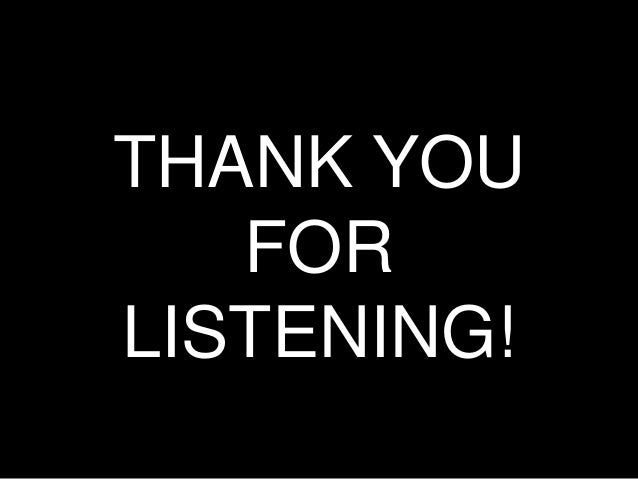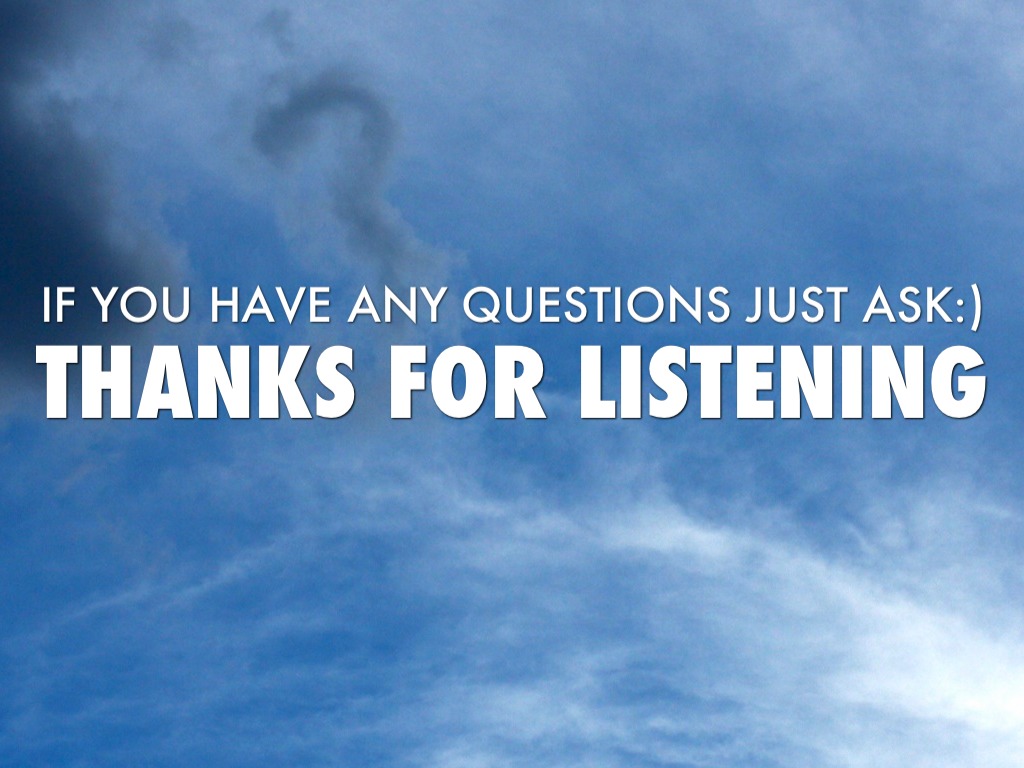
- #Thank you for listening no questions how to
- #Thank you for listening no questions download
Increased exposure is one of the best remedies for a limited vocabulary.

#Thank you for listening no questions download
Watch shows, listen to podcasts and download music in English. Practice your listening skills in every way possible. When I talk about TOEFL Listening practice, I don’t mean just taking practice exam after practice exam. That’s why it’s important to always look up words you don’t know, and practice, practice, practice. It’s not always about strategy when it comes to getting these questions correct.
Misinterpreted the tone of the lecturer (or speaker). Misunderstood the topic of the lecture (or conversation). Heard some challenging vocabulary words. If you’re still getting questions wrong, you may have… Understanding the question type will give you hints and clues as to what to look for and which responses to eliminate. If you can recognize the type of question you have to answer, you’ve already won part of the battle. This is a question where you must fill out a table and indicate the correct information. “How does the professor organize the information “What does the speaker mean when he says…” If you plan to answer questions after your presentation or host an interactive session, presentation thank you images will prompt your audience to leave the meeting. “What can be inferred about the student?” “Why does the student visit the professor?” “What is the professor mainly discussing?” Please rotate your phone to landscape in order to see it." To further explain the concept of linguistic relativity To argue that linguistic relativity is not an accurate hypothesisĭ. To provide an example of linguistic relativityĬ. To prove that linguistic relativity is a viable hypothesisī. Why does the professor talk about the word ‘ambivalent’?Ī. You can predict what someone is thinking based on their languageĢ. How linguistic relativity shapes the way we thinkĭ. The idea that language affects our experiencesĬ. If certain words don’t exist in your language, there’s a reasonī. Essentially, the hypothesis argues, if a person can’t describe the experience, the person is not having the experience. Studies have shown, for instance, that unless people have access to the word ‘ambivalent’ they don’t recognize an experience of uncertainty due to conflicting positive and negative feelings about one issue which is the definition of ambivalent. The hypothesis, which has also been called linguistic relativity, states that language shapes thought. “I so appreciate your help.”- This is casual but could also be used to speak with a colleague.The Sapir-Whorf hypothesis is based on the idea that people experience their world through their language, and that they therefore understand their world through the culture embedded in their language. “I just want to say how grateful I am that you _.”. #Thank you for listening no questions how to
“I don’t know how to thank you for helping me with this.”.“Thank you for going out of your way to help me with this.”.“Thank you for going to so much trouble.”.This would be fine to say to a colleague. You mean “thank you for going to so much trouble.” When you say, “thank you for your trouble” it’s clear that this is not using the word “trouble” in the negative sense. Maybe she stayed late at work until 2 am to help you prepare for a presentation when she didn’t have to. Let’s assume we’re at work thanking a colleague, but the colleague has gone beyond what she was expected to do to help you.

We need to know a little bit more context.Īre you at work thanking a colleague for completing a project?Īre you thanking a neighbor for doing you a favor? Will it be ok to use it?Īnd could you recommend another phrase to thank for somebody? I know the ‘trouble’ has various definition, and the word in the context is not a real trouble(negative). I just worry if a native speaker misunderstand about the word ‘trouble’. I wanted to use “Thank you for your trouble.” when I really thanks for someone’s work. I have a question about the word ‘trouble’. Here is our listener question from today: Today we’ll show you all of the right words and phrases to use. Do you want to be able to say thank you to a colleague and express your gratitude in a way that will build the connection with the person?






 0 kommentar(er)
0 kommentar(er)
